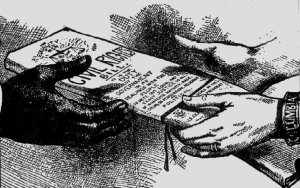Blog #71 – Reconstruction – Success or Failure?
I don’t like to give you just a two-pronged choice, because logically, there are more than two choices to choose from. So, what I’d like you to do is weigh the article we looked at in class on Monday (“The New View of Reconstruction“) and the section at the end of Ch. 22 (How Radical was Reconstruction?), and the notes we’ve done and the video (Aftershock), and make your own decisions about Reconstruction’s success or failure.
In the old school or William Dunning interpretation, Reconstruction was a miserable failure that blundered in giving freedmen their rights (which they weren’t ready for), but Andrew Johnson and the Klan were portrayed as the heroes of the era because they tried to ease the country back  together painlessly (Johnson) and pushed for restoration of home rule (Klan). Reconstruction governments were filled with scalawags and carpetbaggers who corrupted the states and raised taxes.
together painlessly (Johnson) and pushed for restoration of home rule (Klan). Reconstruction governments were filled with scalawags and carpetbaggers who corrupted the states and raised taxes.
Under some of the new interpretations, especially the Progressive and Neo-Progressive / New Left ones in the 20th Century, the Dunning interpretation is flipped on its head. Andrew Johnson was a racist who stood in the way of the idealist Radical Republicans who wanted to give freedmen their full and equal rights. The Klan was not the protector of the South but a haphazard terrorist organization that kept blacks from voting and intimated both whites and blacks in the South. And the Southern state governments, Republican by nature, may or may not have helped out the freedmen. One thing is certain: the governments, from the local and state all the way up to the federal level (think Credit Mobilier) was corrupt. Moral standards were low during this time period and many people (as we’ll see in one of our next units) are in it to make a quick million or two.
Things to think about when looking at the positives of Reconstruction:
1. Slavery was abolished after the war with the 13th Amendment. The next two amendments laid the ground work for equal protection under the law and the right to vote.
2. As mentioned by Foner, nowhere else in the world were former slaves so quickly included in the discussions of the country’s politics and the direction it was headed.
Things to think about when looking at the negatives of Reconstruction.
1. The Klan intimidated, killed, and punished blacks and whites.
2. The Southern state governments were undoubtedly corrupt with carpetbaggers and scalawags in charge. They may also have not been very helpful to their constituents.
3. Very little good land was distributed to the freedmen, leaving them stuck in tenant farming.
Your task: explain whether or not you think Reconstruction was a success, failure, or a combination of both. Use evidence from the notes, articles, and video that we’ve seen.
Due Wednesday, January 14th by class. Minimum of 300 words.

